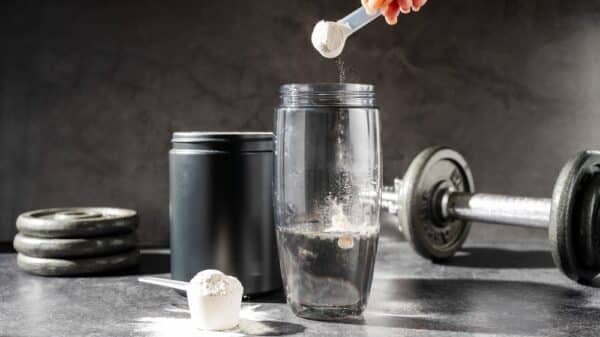Well-known functional medicine specialist and bestselling author Mark Hyman, MD, noted on Instagram that numerous calcium-rich foods are actually dairy-free yet still provide a wealth of other health advantages to keep you at your best. Check out his top picks for calcium-rich foods, along with selections from dietitian Suzanne Pirkle, MA, RDN, CED-S, to help you easily and deliciously meet the recommended daily intake of 1,000 mg, no matter if you’re on a plant-based diet or not.
The Advantages of Calcium
“Nearly every cell in your body utilizes calcium in one way or another,” emphasizes registered dietitian Carissa Galloway, RDN, who also serves as a nutrition consultant for Premier and a personal trainer. “Calcium is essential not only for forming strong teeth and bones—where 99 percent of the body’s calcium resides—but also plays a crucial role in our nervous system and muscle contraction regulation.” Calcium is vital for blood clotting and is important in preventing and treating osteoporosis, she notes.
How Much Calcium Do You Need?
“Like any other nutrient, your calcium requirements vary based on several factors such as age and gender,” explains registered dietitian Jennifer Maeng, MS, RD. “Generally speaking, the recommended dietary allowance for calcium stands at approximately 1,000 mg each day for the average adult. However, teens, post-menopausal women, and older adults beyond 70 require a higher intake.”
To maximize the effectiveness of the calcium you consume, it’s crucial to also ensure adequate vitamin D intake, Maeng emphasizes. “Vitamin D is essential for calcium absorption in the body,” she states. “Without sufficient vitamin D, even a well-balanced calcium intake won’t allow your body to utilize the mineral effectively for health benefits.”
Top Calcium-Rich Foods for Strong Bones and Muscles
1. Nuts and Seeds
Seeds are noted for being packed with nutrients, and they’re particularly high in calcium. Pirkle often includes sesame, chia, sunflower, and poppy seeds in her diet to increase her calcium levels. “Sesame seeds contain about 351 mg per 1/4 cup, representing more than a third of the daily recommended amount,” she explains.
Although consuming a full quarter cup of sesame seeds at once may not appeal to everyone, you can spread your intake throughout the day. They make excellent additions to salads for a pleasant crunch and can enhance smoothies or energy bites for a boost before or after workouts. Don’t forget that tahini is also included in your calcium intake, so enjoy drizzling it over your meals!
Regarding nuts, “almonds are a fantastic snack and provide a good source of beneficial poly- and monounsaturated fats,” she adds. “While all nuts offer some calcium, almonds have the highest content, providing about 246 mg per cup, along with beneficial minerals like magnesium.”
2. Dark Leafy Greens
Many of us were raised to associate spinach with strength, thanks to Popeye’s influence. While he was right about its benefits, other greens are equally nutritious. Collard greens, for example, deliver an impressive 268 mg of calcium per cup, along with generous amounts of vitamin B6 and sleep-enhancing tryptophan, according to Dr. Hyman. Pirkle also highlights kale, turnip greens, and dandelion greens for their calcium contributions.
To diversify your calcium sources, consider rotating the types of dark leafy greens you use in salads and smoothies each week. Dandelion greens support liver health and are rich in potassium, while turnip greens offer significant amounts of vitamin K—about 153 percent of your daily requirements in one cup.
3. Cheese
For cheese aficionados, it’s time to celebrate. Mozzarella is an excellent source of calcium, providing 333 mg per one-and-a-half-ounce serving, which covers about a third of your daily calcium requirement. Besides being a scrumptious topping for pizzas, mozzarella pairs beautifully with fresh fruits, vegetables, and herbs in salads. Consider topping your Caprese salad with sesame seeds or incorporating spinach into your pasta dishes for an additional calcium boost. A sprinkle of Parmesan cheese can also be beneficial—“one ounce contains about 314 mg of calcium,” notes Maeng.
4. Canned Fish
Canned fish, especially sardines and salmon, is a staple among nutritionists. Sardines are particularly noteworthy for their calcium content, offering 351 mg per can, as Dr. Hyman points out. These fish are also rich in phosphorus and provide vitamin D, both essential for strong bones, muscles, and teeth.
Canned salmon boasts an impressive 826 mg of calcium per can, which is more than 80 percent of your daily requirement. Additionally, salmon is a great source of omega-3 fatty acids that promote heart health. Canned fish makes for a quick and easy meal option, whether it’s a salmon burger or a pasta dish featuring sardines.
5. Soy Foods
Tofu and other soy-based foods are well-known for their rich plant-based protein content. Tofu specifically provides 61 mg of calcium per serving, with many varieties fortified with additional calcium for even greater benefits. It also contains iron and ALA omega-3s, which contribute to heart health and combat inflammation.
Tofu’s versatility makes it great for various dishes; include it in stir-frys, make a plant-based ricotta, blend it into smoothies, or use it in place of scrambled eggs for a morning calcium boost. Pirkle reminds us that edamame provides around five percent of daily calcium needs, while one cup of fortified soymilk contains about 23 percent, on average.
6. Yogurt
If you prefer a creamy breakfast option, consider yogurt to increase your calcium intake. This food ranks among the best sources of calcium, providing 415 mg per eight-ounce serving of low-fat plain yogurt. Choose yogurt that contains probiotics for an additional heart health boost—it’s delicious as is or in smoothies, overnight oats, or paired with nuts and berries for a magnesium-rich evening snack.
7. Milk
Milk is often regarded as one of the most obvious sources of calcium. “One cup of cow’s milk provides between 300 and 325 mg of calcium, depending on the fat content—this accounts for about 25 percent of the daily recommended amount,” explains Maeng. “Goat milk offers around 330 mg, similarly providing 25 percent of daily value per cup.”
8. Beans
Many budget-friendly sources of calcium exist, too. “One cup of garbanzo beans provides approximately 244 mg of calcium,” states registered dietitian Carissa Galloway, RDN.
Is Excess Calcium Consumption Possible?
“Hypercalcemia refers to a condition marked by high levels of calcium,” says registered dietitian Kim Rose, RDN. An excessive calcium intake might lead to symptoms like increased thirst and urination, as well as nausea, vomiting, constipation, and confusion. However, this condition is rarely triggered by calcium-rich foods. “Most calcium overload occurs due to excessive supplementation rather than diet,” Galloway explains. “Typically, adults should limit their calcium intake to no more than 2,000 mg daily.”
Image Source: Danijela Maksimovic / Shutterstock

































